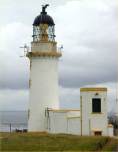|
Margaret Aitken's Stroma Memories
The 20ft. open motor boat reared and plunged across the turbulent Sound
that separates John o’ Groats from the two and a half by one and a half
mile island of Stroma. “A lifetime of this! What have I let myself in
for?” I asked myself as I cowered, sea-sick, in the bottom of the boat
under a tarpaulin. My husband and I, newly married, were on our way to
Stroma Lighthouse where my husband was to work as Second Assistant
Lightkeeper.
 A
ricketty lorry with a one-legged driver took us from the pier at the south
end of the island to the lighthouse station at the north end. Along
one side of the bumpy road, stone, slate-roofed cottages, many in ruins,
were spaced out. A
ricketty lorry with a one-legged driver took us from the pier at the south
end of the island to the lighthouse station at the north end. Along
one side of the bumpy road, stone, slate-roofed cottages, many in ruins,
were spaced out.
Our house was the middle one in a block of three. Its four rooms
were furnished with oak tables, a pine dresser, iron beds with brass knobs
and brass oil lamps for light. For heating water there was a black,
coal-burning stove, and for cooking, a paraffin oil cooker with a
ventilated tin box oven. Drinking water had to be carried from a tap
at the station’s gate. Water for washing up and for doing the laundry or
taking a bath in the washhouse at the end of the house block, and for
flushing the lavatories situated at the end of a block of buildings used
for storage and coal, was collected from roofs and concreted courtyard in
underground tanks and piped into the sinks in the small sculleries off the
living rooms, wash-house and cisterns.
A large walk-in store-cupboard opened at the end of the central
passageway that led in from the front and only door. This cupboard
had to be kept well stocked with foodstuffs, for supplies and mails from
the Scottish mainland could be brought to the sole shop and to the Post
Office only when the weather permitted a boat to cross.
When we arrived on Stroma in 1955 there were about 80 islanders as well
as a Principal Lightkeeper, his wife and schoolgirl daughter and a First
Assistant Lightkeeper. A harbour was being built so that boats could
be kept afloat in all weathers instead of having to be beached. The
islanders had small crofts and boats for lobster fishing and bringing home
supplies and mail. There was a teacher, a nurse, and a minister came
occasionally from Caithness to hold services in the church. There
was a telephone connection between lighthouse and Post Office, and at the
church gate there was a radio telephone for making contact with the
outside world.
But change was in the air. At the lighthouse, the Principal
Keeper retired and the First Assistant was posted. The new Principal’s
wife brought a billy goat and two nannies so we had an independent supply
of milk. Electricity was installed, principally to operate a radio beacon,
but supplying enough energy too for each house to have electric light, a
refrigerator and one heater. Each house was also provided with a calor gas
cooker. However, those were not the most drastic changes.
Despite the provision of a harbour, the island was in the throes of
depopulation. The shop, the church, and the school had to close. By 1958
there remained one island family of four and five people at the
lighthouse. It was sad to watch the island die, but wonderful to
realise it was really still very much alive. I became aware of, for
me, a new, fascinating world, and can now look back on three of the
happiest years of my life.
In winter, along the east side of the island, squadrons of
oystercatchers flew in black and white formations while turnstones, ringed
plovers and purple sandpipers swirled past like clouds of silvery leaves.
Mallard, wigeon, teal and shelduck paddled near the shore’s edge.
About the middle of March, kittiwakes, guillemots and razorbills fluttered
in their hundreds on the west side’s 100 ft. high cliffs. By the end
of April celandines shone in the withered turf and white- flowered scurvy
grass cascaded down the cliffs. There were the nests of lapwings, meadow
pipits and snipes. In May, ditches brimmed with marsh marigolds and
lady’s smocks, and sea-pinks, primroses and violets bloomed. Herring and
black-backed gulls nested on the cliff-tops and eider ducks among the
heather. Great skuas pursued gannets and fulmar petrels glided above
their powder puff chicks As the young birds made their trial flights I
sent a wish heavenward - “Please let us live through it all again.”
Then Stroma became a rock station, which meant only keepers no wives at
the station. We were posted. Forty years later I still think longingly of
my first lighthouse. |